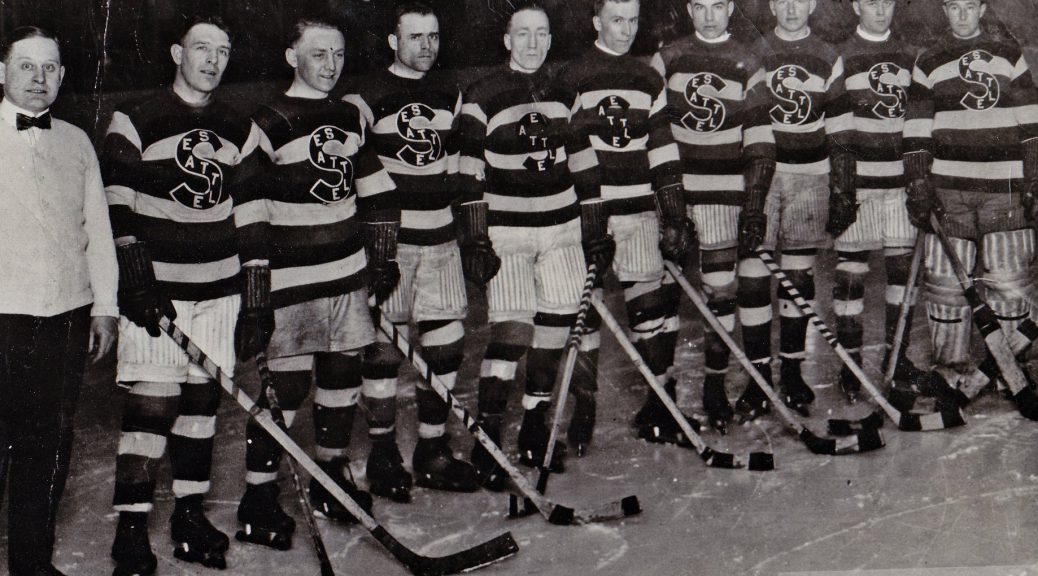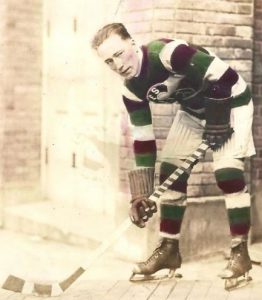
Archives Spotlight: The Seattle team that became America’s first Stanley Cup champion
This week, Seattle took a giant step closer to procuring a National Hockey League franchise.
On Tuesday, February 13, Oak View Group Seattle — an ownership group headed by Hollywood producer Jerry Bruckheimer, who has given us such classics as Armageddon and Top Gun — formally submitted an application for expansion along with a $10 million application fee. The same group has also agreed to renovate Seattle’s Key Arena (sigh, come home, Sonics) at a $660 million expense. They will also pay a $650 million league fee upon approval of the expansion.
There is no guarantee the Seattle NHL dream will become reality, but it is looking more likely all the time. Washington is rumbling with suggestions for the team’s name and buzzing about season ticket sales. Thirteen potential names and 38 web domain names have been registered by OVG. Possible team names include: Cougars, Eagles, Emeralds, Evergreens, Firebirds, Kraken, Rainiers, Renegades, Sea Lions, Seals, Sockeyes, Totems and Whales. Not many great names, but we’re already doing better than the Vegas Golden Knights. (My vote is for Sockeyes.)
Season tickets will most likely go on sale before we find out if an expansion team is approved. Sales will gauge fan interest.
This would become the first Seattle major league hockey team in most of our lifetimes, but it wouldn’t be the first in Seattle history.
Retired hockey players Frank and Lester Patrick launched the Pacific Coast Hockey Association with three Canadian teams in 1912. The brothers used money from the sale of their family lumber business to build arenas and lure players from the National Hockey Association’s teams in eastern Canada. In 1913, the two leagues agreed to compete for the Stanley Cup, which made the trophy fair game for the West Coast. The PCHA expanded into the United States in 1914 with the creation of the Portland Rosebuds.
In 1915, PCHA added the Seattle Metropolitans and spent generously to poach five top players from the reigning Stanley Cup Champion Toronto Blueshirts to make the expansion club competitive. In their first year, the Mets missed the playoffs, but posted a respectable 9-9 record.

In year two, the Mets finished the 1916-17 season as PCHA Champions with a record of 16-8 and faced the Montreal Canadiens in the Stanley Cup finals. Montreal was going for back-to-back Cups. In the best-of-five series, games one and three were played under PCHA rules (seven players), and games two and four under NHA rules (six players).
Here’s how the championship series played out:
Game one: Montreal took the series lead with an 8-4 victory over the Mets. Despite falling behind 5-1 after the first two periods, Seattle nearly made it a game with a couple late goals before Montreal pulled away at the end. A fight broke out between Seattle’s Roy Rickey and Montreal’s Billy Coutu.
Game two: The Mets punched back with a commanding 6-1 win. Frank Foyston, a former Blueshirt who was voted PCHA’s Champion All-Around Hockey Player for 1916-17, led scoring with a hat trick. A Montreal goal in the last couple minutes spoiled the shutout. Another fight broke out between Rickey and Coutu.
Game three: In what started out as a defensive battle, most of the scoring happened in the final period. Series hero Bernie Morris scored twice and Foyston once on the way to Seattle’s 4-0 lead before Montreal’s garbage-time goal again broke up a shutout. Yet another fight broke out between Rickey and Coutu, this time incurring lengthy stays in the penalty box for each player.
Game four: Montreal pretty much never stood a chance. The Mets scored four times in the first period and three times in the second to make it 7-0. The Canadiens once again escaped a shutout with a third-period goal, but that was not much of a consolation in the 9-1, Stanley Cup-clinching game. Morris scored six goals in this game. The Seattle Times on March 27, 1917, described a raucous crowd that made the arena shake (sound familiar, Seahawks fans?) as the game closed out.
The Seattle Metropolitans won the Stanley Cup, becoming the first American team to ever win it. The victory changed the sport forever by showing an American team could compete against the sport’s best.
The Mets went on to play in two more Stanley Cup finals.
In 1919, another Cup final against the Canadiens was tied (2-2-1) when it was canceled due to the Spanish influenza epidemic. Four days after the last game, Canadiens defenseman “Bad” Joe Hall died at 36 from the flu in Seattle’s Columbus Sanitarium (which later became Cabrini Hospital).
The Ottawa Senators defeated Seattle in 1920, in a finals that went to game five. Seattle qualified for the playoffs three more times before the team folded in 1924 after the Seattle Ice Arena was converted into a hotel parking garage The IBM Building at Fifth Avenue and University Street stands on its site today.
To this day, only five other West Coast teams have ever hoisted Lord Stanley’s Cup (the Vancouver Millionaires in 1915, Victoria Cougars in 1925, Anaheim Ducks in 2007, and Los Angeles Kings in 2012 and 2014).
Discover more of Washington’s fascinating history at the Washington State Archives.